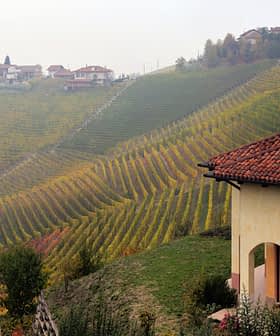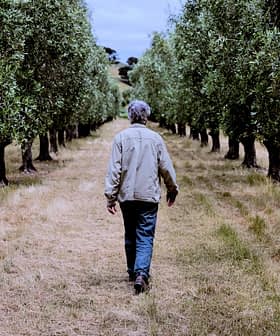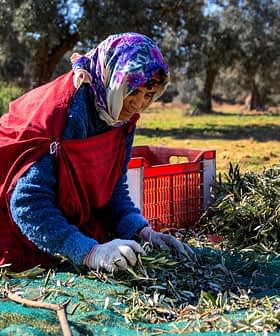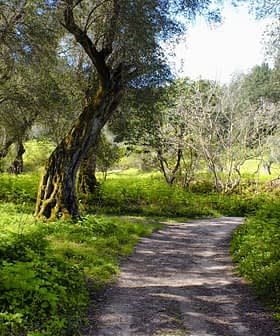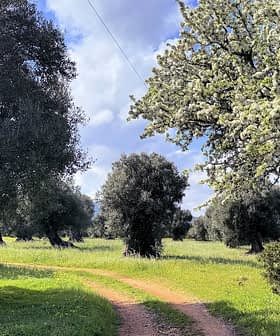U.N. Developing Olive Groves and Mills in Drought-Prone Areas of Iraq

A restored irrigation project in Iraq has just been officially launched by local authorities and United Nations officials from the Food and Agriculture Organization (FAO).
Its recovery and reopening will impact a large agricultural area near the Syrian border. The announcement comes as an intense and prolonged drought plagues large swaths of the country, accelerating desertification and threatening crops.
We produce approximately 200,000 liters of high-quality extra virgin olive oil, but we intend to continue the expansion of our production as we are focused on involving more farming areas.
The new project, largely financed by the European Union, was initially launched by the northern governorate of Al-Jazīrah in 1990.
However, the infrastructure was heavily damaged during the self-proclaimed Islamic State (ISIS) occupation, to the point that local farmers ceased operations in an area already hit by the consequences of climate change.
See Also:Olive Cultivation Is Expanding in GeorgiaAccording to the United Nations Office for the Coordination of Humanitarian Affairs (OCHA), the recovery project included the reconstruction of the water pumping station at Tel Al-Hawa, and the rebuilding of 11 bridges, 17 power transmission towers and 21 water control gates.
The massive restoration required the cleaning of irrigation canals from silt and debris engaging 1,250 households through a cash-for-work scheme and providing spare parts to 150 linear-move irrigation systems.
Even though the most relevant portions of the Iraqi economy are related to oil and gas, farming represents the third most relevant economic activity.
It is believed that more than 200,000 people from the town of Rabia and the surrounding areas will benefit from the resumption of agricultural activities.
Local authorities are struggling to maintain water security for the population and farming in large areas of the country.
The World Bank estimates that more than 40 percent of the country is currently desert and sparsely populated because of the harsh climatic conditions, which include the worsening phenomenon of heatwaves and sandstorms.
Among the current challenges, the bank’s experts cite the reduced availability of good quality water due to the widespread salinity.
“Desertification and water scarcity due to river flow fluctuations render Iraq vulnerable to the adverse effects of climate change,” World Bank officials wrote.
Areas once known for their farming activities, such as the southern Iraq palm tree plantations, have slowly lost land to desertification and salinization. The ongoing drought exacerbates the existing fragility of the agricultural sector.
According to the U.S. Department of Agriculture, the Iraqi government has recently opted to halve the amount of water that can be used for farming activities, a decision due to the reduced amount of water flowing in from the Tigris and Euphrates rivers.
At the beginning of May, the Ministry of Agriculture warned that desertification risk is now covering 90 percent of the country due to climate change effects and the current disputes with Iran and Turkey about the use of common water river resources.
According to Al-Monitor, the ministry warned that the rate of desertification is increasing with growing consequences for food security. A ministry official told the magazine that military conflicts, excessive use of water by farmers and citizens, drought and climate change are the main drivers of the current crisis.
Since the 1950s, temperatures in Iraq have steadily risen. According to the U.S.-based Tahir Institute for Middle East Policy, the frequency of heatwaves reaching 50 ºC or more is increasing and it is believed that surface temperatures will rise by two or three degrees by the end of the century.
In this context, the government is supporting the launching of new farming activities by private entrepreneurs in challenging areas.
With the ambition of becoming the most relevant olive oil producer in the country, Rasan Factory was launched in 2018 in the Kirkuk governorate near Halabja, more than 200 kilometers north of Baghdad.
“Since the beginning, we aimed not only at making excellent high-quality extra virgin olive oil but also to offer job opportunities and promote business on a local and regional level,” Ahmad Ali Tamas, owner of the company, told Olive Oil Times.
“Our country used to have so many olive tree plantations once, but there was no real culture on how to manage the trees and how to keep them healthy,” he added. “It was low-quality production which would have no place on the international market.”
According to the Iraqi olive oil producer, the price dynamics in the local market have changed so that it is now easier for olive farmers to earn a sufficient income for their work.
“There has been a relevant shift in the way consumers approach quality olive oils,” he said. “The popular culture once perceived them as specifically useful for medicine or cosmetics.”
“Now, people are both more aware of the health profile of extra virgin olive oil and more interested in using the higher quality olive oil for cooking,” Tamas added.
One of the most relevant qualities of the olive trees for local farmers is related to the high resilience of most cultivars to drought and water deficits.
In the last few years, several internationally-supported programs have been started in several areas of the country in order to harness olive tree resilience.
Only a few months ago, the U.N. World Food Program participated with local authorities and the local association of olive oil producers in the opening of a new state-of-the-art olive oil mill in Bashiqa, in northern Iraq.
The aim of the initiative is to restore local olive production, involve farmers in a project of social and economic development and connect olive oil production to the local and international markets.
Due to the work of several nonprofit organizations and the support of local authorities, the U.N. Development Program is behind olive development projects in the area of Haditha, one of the major cities of the governorate of Anbar, a largely desert area in the central-western part of the country.
The project began with recovering infrastructure and land which had been devastated by the ISIS occupation. In the last few months, more than 250 hectares lost to desertification were converted to sustainable farming.
Besides olives, local farmers have been supported with saplings from cucumber, pistachios, aloe vera and date palms.
Given the revived interest and abilities in olive oil production, Iraq has recently opened negotiations with the International Olive Council to return to the council, a move that would greatly enhance the sector’s expert training and technology exchange opportunities.
The local scenario might be extremely challenging, but Tamas emphasized how local farmers know that working day by day in the right direction will yield optimal results.
“Today, we produce approximately 200,000 liters of high-quality extra virgin olive oil, but we intend to continue the expansion of our production as we are focused on involving more farming areas,” he concluded.



